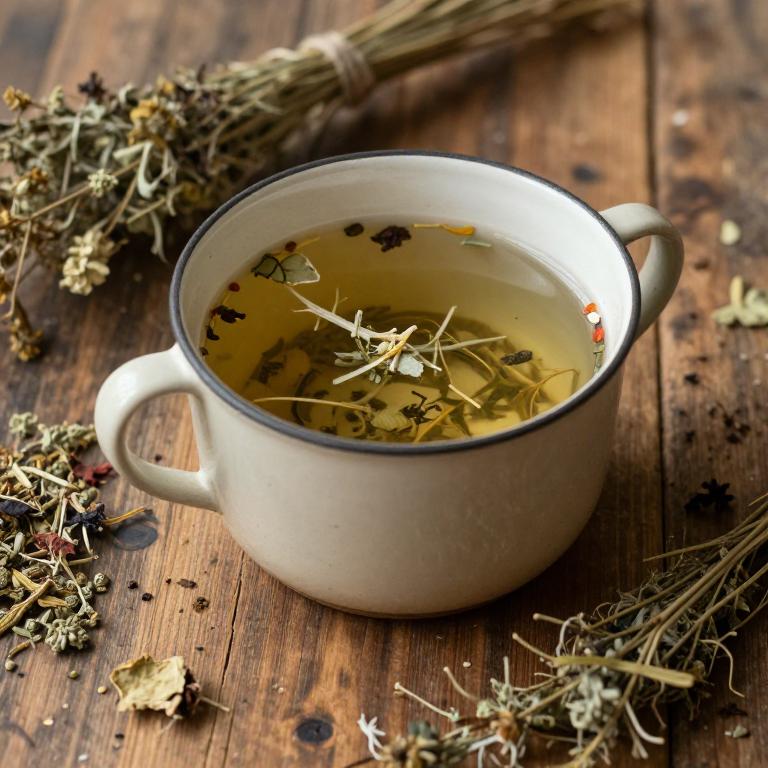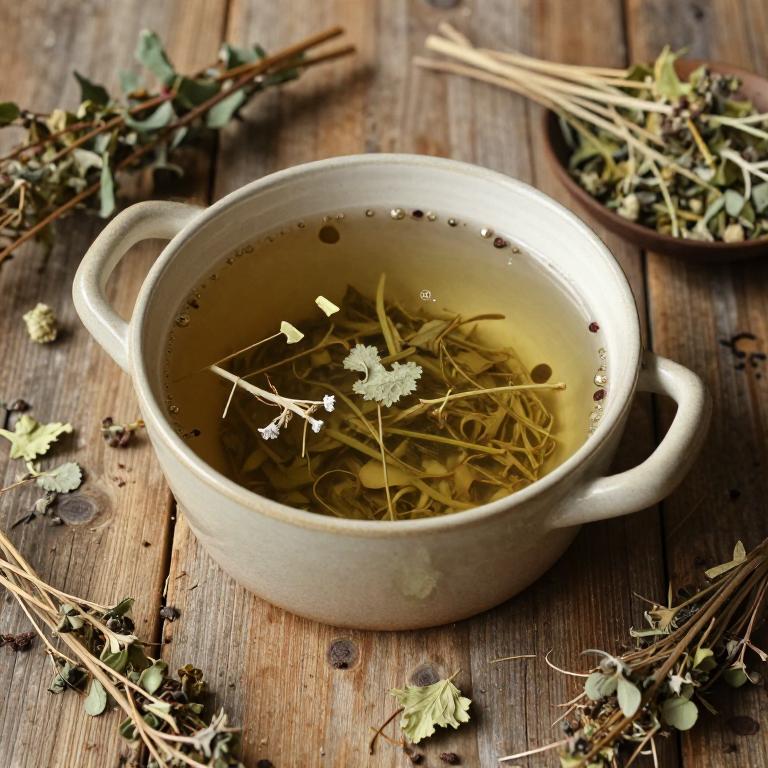10 Best Herbal Decoctions For Fluid Retention

Herbal decoctions have been traditionally used to address fluid retention by promoting diuresis and balancing the body's water levels.
Common herbs such as dandelion, parsley, and nettle are often included in these preparations due to their natural diuretic properties. These herbs work by supporting kidney function and helping the body eliminate excess fluids through urine. Herbal decoctions are typically prepared by simmering dried herbs in water for an extended period, allowing the active compounds to be extracted.
While generally safe, it is important to consult a healthcare professional before using herbal remedies, especially for individuals with existing medical conditions or those taking medications.
Table of Contents
- 1. Thistle (Silybum marianum)
- 2. Stinging nettle (Urtica dioica)
- 3. Blessed thistle (Cnicus benedictus)
- 4. Chaste tree (Vitex agnus-castus)
- 5. Dog rose (Rosa canina)
- 6. White water lily (Nymphaea alba)
- 7. Field horsetail (Equisetum arvense)
- 8. Ginger (Zingiber officinale)
- 9. Yarrow (Achillea millefolium)
- 10. Common mallow (Symphytum officinale)
1. Thistle (Silybum marianum)

Silybum marianum, commonly known as milk thistle, is traditionally used in herbal medicine for its potential benefits in supporting liver function.
Herbal decoctions made from the seeds of Silybum marianum are often prepared by simmering the dried seeds in water to extract their active compounds, such as silymarin. These decoctions are believed to help reduce fluid retention by improving liver health and promoting the body's natural detoxification processes. While some studies suggest that silymarin may have diuretic properties, more research is needed to confirm its effectiveness in treating fluid retention.
As with any herbal remedy, it is important to consult a healthcare professional before using Silybum marianum, especially for individuals with existing medical conditions or those taking other medications.
2. Stinging nettle (Urtica dioica)

Urtica dioica, commonly known as stinging nettle, has been traditionally used in herbal medicine for its diuretic properties, making it a potential remedy for fluid retention.
When prepared as a decoction, the leaves and stems of Urtica dioica are simmered in water to extract their beneficial compounds, including minerals like potassium and magnesium, which support kidney function and fluid balance. This herbal decoction may help reduce swelling and edema by promoting the elimination of excess fluids through increased urination. However, it is important to consult a healthcare professional before use, especially for individuals with kidney issues or those on diuretic medications.
Despite its natural origins, Urtica dioica decoctions should be used cautiously and as part of a holistic approach to managing fluid retention.
3. Blessed thistle (Cnicus benedictus)

Cnicus benedictus, commonly known as blessed thorn or St. Benedict's thorn, has been traditionally used in herbal medicine for its potential diuretic properties, which may aid in reducing fluid retention.
When prepared as a herbal decoction, the plant's leaves and stems are simmered in water to extract its active compounds, including flavonoids and triterpenoids, believed to support kidney function and promote the elimination of excess fluids from the body. This decoction is often recommended for individuals experiencing edema, particularly in cases of mild fluid retention associated with dietary factors or hormonal imbalances. However, it is important to consult a healthcare professional before use, as it may interact with certain medications or conditions.
Overall, Cnicus benedictus herbal decoctions are considered a natural complement to supportive care for fluid retention, though they should not replace medical treatment.
4. Chaste tree (Vitex agnus-castus)

Vitex agnus-castus, commonly known as chaste tree, has been traditionally used in herbal medicine to address hormonal imbalances and associated symptoms, including fluid retention.
Its active compounds, such as flavonoids and essential oils, are believed to support the pituitary gland and regulate prolactin levels, which may influence fluid balance in the body. Herbal decoctions made from vitex are often prepared by simmering the dried berries in water for several hours to extract their beneficial properties. These decoctions are typically used in a supportive role for women experiencing premenstrual syndrome or hormonal fluctuations that contribute to edema.
While research on vitex's efficacy for fluid retention is limited, many practitioners recommend it as part of a holistic approach to managing fluid retention and related symptoms.
5. Dog rose (Rosa canina)

Rosa canina, commonly known as rosehip, has been traditionally used in herbal medicine for its potential benefits in managing fluid retention.
The decoction of Rosa canina fruits is believed to support kidney function, which plays a crucial role in regulating fluid balance in the body. Rich in bioactive compounds such as flavonoids and vitamins, particularly vitamin C, rosehip decoctions may help reduce inflammation and improve circulation, both of which can alleviate fluid retention. However, it is important to consult a healthcare professional before using rosehip decoctions, especially for individuals with pre-existing medical conditions or those taking medications.
While some studies suggest possible benefits, more clinical research is needed to fully understand its efficacy and safety in treating fluid retention.
6. White water lily (Nymphaea alba)

Nymphaea alba, commonly known as white water lily, has been traditionally used in herbal medicine for its diuretic properties, which may aid in reducing fluid retention.
The root of the plant is often decocted in water to create a herbal preparation that supports the body's natural elimination of excess fluids through the kidneys. This decoction is believed to help alleviate symptoms associated with edema, such as swelling in the legs and ankles, by promoting urinary output. However, it is important to consult with a healthcare professional before using Nymphaea alba as part of a treatment regimen, especially for individuals with pre-existing kidney conditions or those taking diuretic medications.
While preliminary research suggests potential benefits, more clinical studies are needed to fully understand its efficacy and safety in managing fluid retention.
7. Field horsetail (Equisetum arvense)

Equisetum arvense, commonly known as horsetail, has been traditionally used in herbal medicine for its diuretic properties, making it a potential remedy for fluid retention.
The plant contains high concentrations of silica and various bioactive compounds that may aid in reducing water retention by increasing urine production. Herbal decoctions made from the dried stems of Equisetum arvense are often prepared by simmering the plant material in water for an extended period to extract its active components. These decoctions are typically consumed in small doses throughout the day to support kidney function and promote the elimination of excess fluids from the body.
However, it is important to consult a healthcare professional before using horsetail, as it may interact with certain medications and is not suitable for everyone.
8. Ginger (Zingiber officinale)

Zingiber officinale, commonly known as ginger, has been traditionally used in herbal medicine for its potential benefits in reducing fluid retention.
Ginger contains bioactive compounds such as gingerol and shogaol, which may help promote diuresis and reduce swelling by improving circulation and lymphatic drainage. Herbal decoctions made from fresh or dried ginger root can be prepared by simmering the root in water for several minutes, allowing the active compounds to infuse into the liquid. These decoctions are often consumed as a tea or added to meals to support the body's natural processes in eliminating excess fluids.
While ginger is generally considered safe, it is advisable to consult a healthcare professional before using it for persistent fluid retention, especially in individuals with underlying health conditions.
9. Yarrow (Achillea millefolium)

Achillea millefolium, commonly known as yarrow, has been traditionally used in herbal medicine for its diuretic properties, making it a potential remedy for fluid retention.
When prepared as a herbal decoction, yarrow is typically simmered in water for several minutes to extract its active compounds, including flavonoids and volatile oils, which are believed to support kidney function and promote the elimination of excess fluids. This decoction may help reduce swelling and edema by enhancing urine production and improving lymphatic drainage. However, it is important to consult a healthcare provider before using yarrow, as it can interact with certain medications and may not be suitable for individuals with specific health conditions.
Despite its traditional use, scientific research on its efficacy for fluid retention is limited, and it should be used as a complementary, not a replacement, therapy.
10. Common mallow (Symphytum officinale)

Symphytum officinale, commonly known as comfrey, has been traditionally used in herbal medicine for its potential benefits in reducing fluid retention.
The plant contains compounds such as allantoin and rotenone, which may help promote tissue repair and reduce inflammation, potentially aiding in the management of edema. However, it is important to note that comfrey contains pyrrolizidine alkaloids, which can be toxic to the liver, especially with long-term use. Due to these risks, it is generally advised to avoid comfrey in herbal decoctions for fluid retention, particularly for individuals with existing liver conditions or those who are pregnant.
Instead, safer alternatives such as dandelion root or horse chestnut are often recommended for addressing fluid retention without the associated health risks.